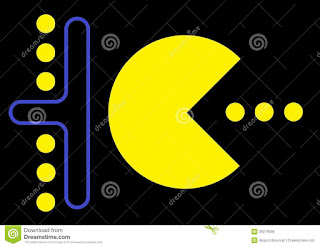Game Fun
For this weeks task we had to read two articles and watch a video on game fun. The first article was called "Gamification Design: What's Fun Got To Do With It". The article talked about the importance of making a game fun and how fun is on every game designers mind obviously because nobody would want to play a game if it wasn't fun. The article shows the favourite elements of gamification in the gaming design process which are narrative, rewards, competition, progress, feedback, challenge, collaboration, exploration and theme and the author mentions that he finds it strange that the word fun doesn't come up in this design process. The article also talks about the definitions of fun which obviously are enjoyment and amusement or light-hearted pleasure and entertainment but in the world of gaming it is defined as pleasurable engagement. The article also goes into the taxonomies of fun and defines the 8 kinds of fun which are sensation: game as sense pleasure, fantasy: game as make believe, narrative: game as drama challenge: game as obstacle course, fellowship: game as social framework, discovery: game as uncharted territory, expression: game as self-discovery and submission: game as pastime. It also talks about the MDA framework which we have previously learned about and how it has developed over the years. Then it moved onto the 4 types of fun which are easy fun(novelty): curiosity from exploration, hard fun(challenge): Fiero, the epic win, from achieving a different goal, people fun (friendship): amusement from competition and cooperation, serious fun(meaning): excitement from changing the player and their world. It then explains to us that these four reasons why people play games are how best sellers create more emotions for more captivating play. It then tells us the 5 groups of fun which are achievement fun, free spirited fun, social fun, facilitated, personal fun and unfacilitated, personal fun. Achievement fun consists of curiosity, learning, problem solving and challenge. Free spirited fun consists of exploration, discovery, surprise and creativity. Social fun consists of family, collaboration, competition, altruism and fellowship. Facilitated, personal fun consists of narrative, progression, immersion and fantasy. Un-facilitated, personal fun consists of humour, sensation, flow and schadenfreude.
The second article was called "Putting The Fun Factor Into Gaming: The Influence Of Social Contexts On Experiences Of Playing Video games". This article talks about flow. The concept of flow was developed by Csikszentmihalyi. He based it on his own observations of the high levels of enjoyment experienced by a group of artists. Flow is known as the positive subjective state someone experiences when they are doing an enjoyable activity for example when someone is really focused on a game and become completely unaware of what's going on around them they are in a flow state. The article also talks about the positives of social gaming. It talks about how while people believe playing video games is an anti-social activity it actually isn't due to the fact that people can play video games online with their real life friends and make new friends online. It takes about how online multiplayer video games encourages people to both play video games and socialise. It also tells us that it has been proven that most gamers prefer to play games online rather than offline and that would be the case for most people I know. It also tells us that social interaction also motivates people to play games more. The article also talks about how gamers were chosen by computer game development and game design degree programmes to ensure that they would play video games regularly. 17 gamers aged 18-24 were selected. They then broke these people into smaller groups and asked them to discuss their experiences with social gaming. They were then asked to fill out a questionnaire about why they play video games and their gaming experiences. The results revealed that people found their experiences playing video games online with other people more fun especially when playing on the Nintendo Wii. I myself also found playing the Wii way more fun with others although they also said online gaming can increase frustration due to the competitiveness.
We then had to watch a video called "A Theory Of Fun For Game Design". The video talks about the importance of fun in video games and how fun is a dopamine in our brains that fires when it is presented with new challenges. It also talks about how chess teaches us strategy, poker teaches us about deception and civilisation teaches us systemic analysis and resource management. It also tells us that type 1 games are about thinking, type 2 games are about reflex type skills for example, Mario, Street Fighter and shooting games. The video also talks about flow theory. The whole concept of the video is that the idea of fun in video games is to make them challenging so that the player will feel more inclined to focus on the game and continue playing and remain in a flow state while playing the game.




Comments
Post a Comment